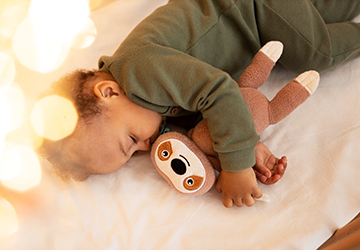The baby-rearing task of getting a good night's sleep is fleeting. Such a trip is unique because it includes bleary eyes, zero count of all the middle-of-the-night feedings, and numerous failed attempts to silence a crying baby. But my dear parent, don't worry that much because there is a light at the end of the tunnel.

Let's discover intelligent techniques to help your baby sleep independently throughout the night so you can get some needed sleep and relax. You can create a relaxing bedtime routine from here to the proper sleep setup; we've got you covered. Hence, find a cup of coffee (tea instead) that doesn't have caffeine, and then let's begin.
Establishing a deliberate bedtime routine can be vital in allowing yourself and your baby to have a good night. Babies are the best subjects to routine; therefore, the simple and calming way should be the gist. First, allow your little one to enjoy a warm bath to relax their muscles and calm their senses. Take the massage further by gently using baby lotion, relaxing you both and strengthening your bond.
Finally, before you go to sleep, try dimming the lights in the room to create a peaceful environment. Next, hug your baby and read him a bedtime story in a gentle, soothing voice. This moment allows the baby to easily perceive that it is time to quiet down and thus get ready for bed. In the end, gently hum a lullaby to your kid to help them fall asleep deeply.
Establishing a suitable sleeping environment is critical in helping the baby sleep at night. First, check that your baby's room temperature is moderate—not too hot or cold. A blackout curtain is a powerful tool for blocking light that may interfere with your baby's sleep. It helps create a dark and peaceful atmosphere that promotes rest.
Try to silence the room by installing a sound machine or playing soft nursery songs to drown out any distracting noise that could disrupt your baby's sleep. By establishing a calm, serene environment, you are all set to have a good night's sleep and ensure your young one gets some sweet slumber.
You can promote a good amount of waking time during the day, which will help your baby regularize the sleep-wake cycle. Taking your little one for a walk can help introduce them to sunshine, essential for regulating their circadian rhythm.
During the day, involve your baby in playtime, which can ensure that they access different toys and textures. During the day, keep your baby busy, which in turn will help your baby use daytime energy and then be able to sleep well at night. Furthermore, muscle and intellectual development are fostered through the stimulation and interaction achieved by playing with your baby.
Each baby has its features, but some signs will tell you when they need to be handled to go to sleep. Look for such signs as yawning, rubbing their eyes, fussiness, or clinginess—this is a good indication that your baby is ready to nod off. In that way, you will be able to perform intervention on time before your baby is overtired.
As a result, it will be easier for the baby to fall asleep. Responding in time to your baby's sleep cues and helping them relax and settle when it's time for bed will save the bedtime struggles and ensure a smooth change to sleeping mode. Being carefully watchful for your infant's clues and being proactive in shaping a tranquil sleep space is a precursor for a good night's rest that also means peace for the whole family.
Providing your baby with a safe sleeping environment is an absolute must. Often, babies are put on their backs to sleep, but this reduces the risk of sudden infant death syndrome (SIDS). Opt for a firm mattress without seemingly loose bedding or soft toys that could hinder air intake.
Furthermore, remember the problem of overheating by dressing the baby in light fabrics and using breathable sleep sacks rather than blankets, which can cause suffocation. By strictly following these safety recommendations, you can ensure the safety of your most valuable being.
Consistency is the key to a successful sleep training approach. Plan a regular nap regimen and bedtime to ensure consistency throughout the day; this will help your baby's internal clock improve and signal that the body should rest.
Keeping to the routine may seem complicated and slow, but one should stay encouraged to succeed in facing challenges. After some time, your baby will get used to the schedule so that he will find it easier to sleep at night, and it will be a pleasant experience for all.
While developing independence in sleep is crucial, responding compassionately and attentively to a child's needs is equally important. Don't rush over and take your little one when he cries at night; be patient and wait. Instead, you can offer a comforting touch or a voice to let them know you are there.

This tender assurance calms the baby, and thus, the baby develops the skill of self-soothing by returning to sleep with ease. Just bear in mind that every infant is unique. Therefore, be patient and flexible simultaneously to keep up with the challenges of this journey. That won't be difficult. You will learn to have good sleep habits in the family's best interest every day.
Sometimes, napping time can appear incompatible with a good night's sleep, while a baby needs enough daytime sleep to sleep well. Be attentive to your baby's napping time and ensure it is age-appropriate and spread throughout the day.
Usually, infants take multiple short naps, while older babies can take longer, fewer naps. But remember to avoid too much close napping before bedtime because this may cause them to sleep at night. Observe their awake windows and signs of sleepiness while assessing when to take a nap, and also seek to develop a consistent nap schedule to regulate their sleep patterns.
A consistent approach is the hallmark of sleep training, but you must remain calm and keep your temper. There can be nights when your baby does not settle quickly or wakes up often, but be patient, as this can also be normal. Play along with your baby's needs calmly, and stick to the sleep routine that you have established.
Comfort them and encourage them to relax and not engage in stimulating activities that could inhibit their sleep. Slowly but surely, your baby will learn that bedtime is not only the time to go to sleep but also the time to be in a safe and secure place, consequently reducing their difficulty in sleeping throughout the night. Flexibility and trust are essential traits in this process. Try something different each day, and over time, you'll discover a routine that will work like a charm for you and your child.
Finally, determining the most helpful solution for the baby and the family at night is the most important. It will likely take several attempts, and there will likely be some nights when you won't be able to sleep, but with dedication, persistence, and heaps of love, you'll make it.
Hence, breathe deeply with confidence in your abilities, and don't forget that this phase, too, will pass. You will not notice it, but you will be smiling as you recount those sleepless nights, knowing they were worth all the effort. Here's dears! Let's wish you pleasant dreams and a peaceful night for you and your lovely baby.


